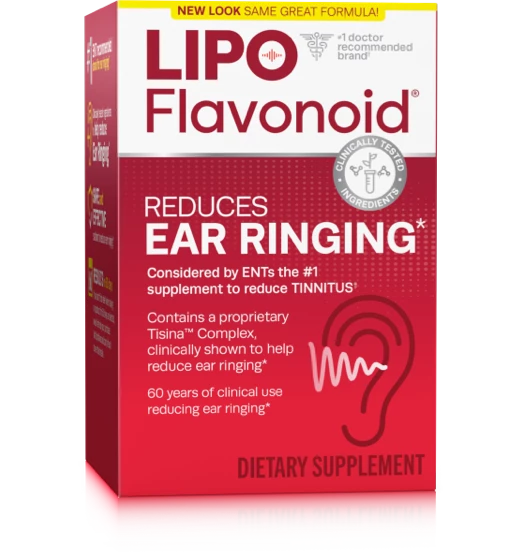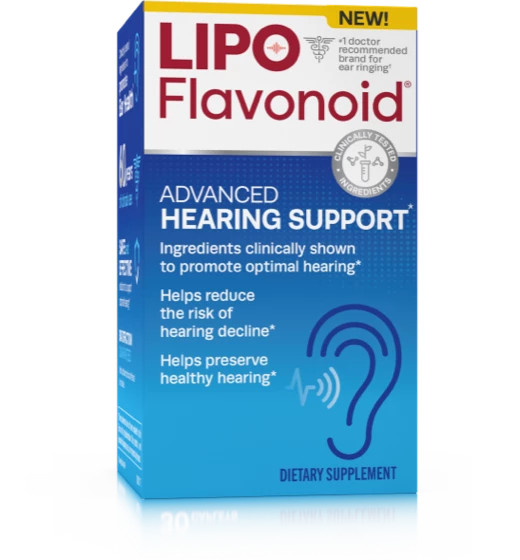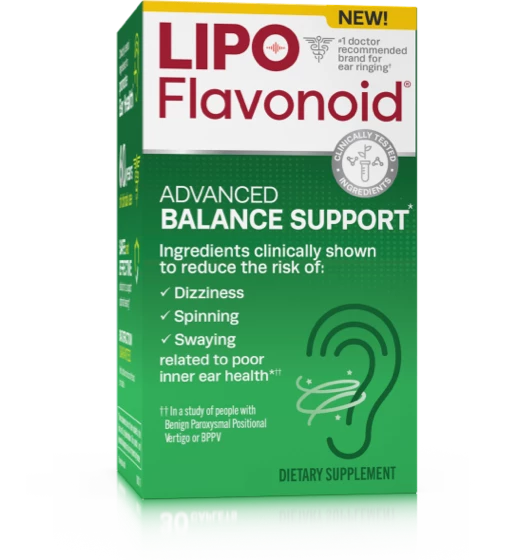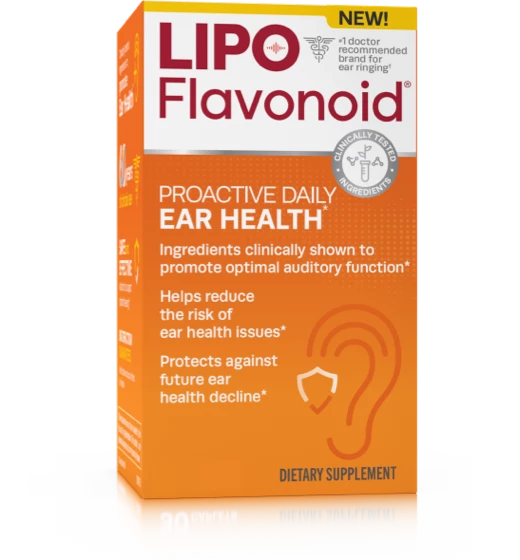- Products
- Science
-
Resources
- Tinnitus Resources
- What is tinnitus?
- Causes of tinnitus
- Tips for managing tinnitus
- Prepare for your doctor's visit
- PTSD and tinnitus
- Tinnitus FAQs
- Hearing Loss Resources
- What is hearing loss?
- Degrees of hearing Impairment
- Types of hearing loss
- Causes of hearing loss
- Treatment options for hearing loss
- Buy Now
- Coupons
- Test Your Hearing
- Test Your Hearing
- Healthcare Professionals
New Products Focus on Tinnitus Sufferers’ Unique Sleep Needs
Just because you have tinnitus doesn’t mean you have to say good-bye to a good night’s sleep. New, innovative products created using the best intel from tinnitus as well as sleep experts can help you look forward to bedtime again.
Did you know that 77% of tinnitus sufferers say their symptoms are most bothersome when they try to sleep?1
Innovations from the makers of Lipo-Flavonoid can help. That’s right, 50 years of clinical use just got better.
Now Lipo-Flavonoid brings tinnitus sufferers options to help with one of their biggest complaints – falling asleep:
- Lipo-Flavonoid Day/Night Kit: Includes Lipo-Flavonoid Plus for the morning and midday doses, and Lipo-Flavonoid Night, which adds time-release melatonin to the evening dose, to help in falling asleep, then staying asleep.
- Lipo-Flavonoid Night: Contains all of the beneficial ingredients of Lipo-Flavonoid, plus it contains time-release melatonin – to help in falling asleep, then staying asleep.
- Sonorest Sleep Tones: is intended to create a tranquil, soothing environment to help tinnitus sufferers relax and fall asleep. It is intended to produce soothing sounds that assist in relaxation and sleep particularly for individuals suffering from ringing in the ears.
Lipo’s new sleep solutions products are available at Walgreens nationwide and on walgreens.com.
Making Smart Use of Melatonin
Melatonin* is a substance produced naturally in the brain but it’s also available over-the-counter to help regulate sleep and wake cycles. More than 3 million Americans concerned about their sleep patterns already use melatonin.2
Thanks to Lipo-Flavonoid, you can now conveniently add melatonin to your daily self-care regimen while also maintaining your intake of the natural bioflavonoids that have been used for decades for the treatment of tinnitus.
Lipo-Flavonoid Day/Night and Lipo-Flavonoid Night® contain the same #1 doctor-recommended3 ingredients as original Lipo-Flavonoid Plus with the addition of evening melatonin.* Each Night caplet contains 3 mg immediate-release melatonin to help initiate sleep and 2 mg time-release melatonin for sleep that lasts.
According to a study in Otolaryngology-Head and Neck Surgery,4 patients with tinnitus who took daily melatonin saw improvements in what they’d previously rated as “poor” sleep.
Similarly, in the Annals of Otology, Rhinology & Laryngology,5 researchers found “Melatonin is associated with a statistically significant decrease in tinnitus intensity and improved sleep quality in patients with chronic tinnitus.”
For best results, take your evening dose of Lipo-Flavonoid Night 1 hour before bedtime.
Sounding Like Sound Sleep
You’ll like the sound of this: The American Tinnitus Association says that sound therapy is one of the most effective tinnitus treatments.6 Why? Because background, low-level, neutral sounds can help to partially block or mask the intensity of tinnitus sounds. For sleep, experts recommend adding sounds to your environment that are nonintrusive, non-stimulating, and easy-to-ignore, but are at a level that eases perceptions of tinnitus.
This is where the Sonorest Sleep Tones Machine comes in. It’s uniquely designed to help tinnitus sufferers create a comfortable and relaxing sleep environment – despite ringing or other phantom noises in their ears. Some noise spectrums or “colors” are recommended more than others for this purpose. For instance, there is evidence that white, pink and brown noise can help reduce the difference between background and “peak” sounds like the buzzing or hissing of tinnitus. Which is why Sonorest Sleep Tones provides you with options for each of these noise spectrums as well as controls to help you find the right tone and volume to ease the disruption caused by your tinnitus.
Need soothing daytime sounds too? Use Sonorest anytime. According to the Hearing Health Foundation, background sound, like what’s provided by Sonorest, may help when focused concentration is required, during difficult periods of the day, or all day.7
Good sleep = good day. Lipo-Flavonoid products are here to help you get there.
*Always consult with a healthcare professional before taking any new dietary supplement. If you are under medical supervision or using any tranquilizers or sedatives, seek the advice of your healthcare professional prior to using melatonin. Consult your healthcare professional prior to using melatonin if you have an autoimmune condition, depressive disorder or are pregnant or lactating. Do not take melatonin when operating machinery or driving a vehicle. People with allergies to soy, wheat, or corn should consult their healthcare professional before taking melatonin. Keep out of reach of children.
References:
- April 2016 Survey. Clarion Brands Inc. data on file.
- National Health Statistics Reports. Centers for Disease Control and Prevention website http://www.cdc.gov/nchs/data/nhsr/nhsr079.pdf. Accessed November 4, 2016.
- April 2016 Survey. Clarion Brands Inc. data on file.
- Melatonin Pills May Help Ease Tinnitus. WebMD website http://www.webmd.com/sleep-disorders/news/20060224/melatonin-pills-may-help-ease-tinnitus. Accessed October 31, 2016.
- Hurtuk A, Dome C, Holloman CH, Wolfe K, Welling DB, Dodson EE, Jacob A. Melatonin: can it stop the ringing? Ann Otol Rhinol Laryngol. 2011 Jul;120(7):433-40. https://www.ncbi.nlm.nih.gov/pubmed/21859051
- Sound Therapies. American Tinnitus Association website https://www.ata.org/managing-your-tinnitus/treatment-options/sound-therapies. Accessed November 1, 2016.
- Sound Therapies. American Tinnitus Association website https://www.ata.org/managing-your-tinnitus/treatment-options/sound-therapies. Accessed November 1, 2016.
- Counseling & Sound Therapy for Tinniuts. Hearing Health Foundation website http://hearinghealthfoundation.org/tinnitus_counseling_sound_therapy. Accessed December 20, 2016
*These statements have not been evaluated by the Food and Drug Administration. These products are not intended to diagnose, treat, cure or prevent any disease.
*Survey data on file
REFERENCES:
- April 2018 Survey. Clarion Brands Inc. data on file.
- Williams H, Hedgecock L. Citrus Bioflavonoids, Ascorbic Acid and Other B-vitamins in the Treatment of certain types of neurosensory deafness a preliminary report. Staff meeting of the Mayo Clinic (1962).
- Tinnitus Overview. Mayo Clinic website http://www.mayoclinic.org/diseases-conditions/tinnitus/basics/definition/con-20021487. Accessed Sept. 7, 2016.
- Understanding the Facts. American Tinnitus Associations website https://www.ata.org/understanding-facts. Accessed Sept. 7, 2016.
- Slattery WH, Fayad JN. Medical treatment of Meniere's disease. Otolaryngologic Clinics of North America 1997; 30:1027-37.
- Kumar S, Pandey AK. Chemistry and Biological Activities of Flavonoids: An Overview. The Scientific World Journal. 2013;2013:162750. doi:10.1155/2013/162750.
- Fetterman BL, Saunders JE, Luxford WM. Prognosis and treatment of sudden sensorineural hearing loss. Am J Otol 1996; 17:529-36.
- Arenberg I, Bayer R. Therapeutic Options in Meniere’s Disease. Arch Otolaryngol 1977;103: 589-93.
- Shaia F, Sheehy J. Sudden sensori-neural hearing impairment: a report of 1,220 cases. Laryngoscope 1976; 86:389-98.
- Herschberg S. Meniere’s disease. J Am Osteopathic Association 1974; 73:540-6.
- Wolfson R. Treatment of Meniere’s disease. Modern Treatment (1969) 6,3, 553-567.
- Rubin W. Vestibular suppressant drugs. Arch Otolaryngol 1973; 97:135-8




